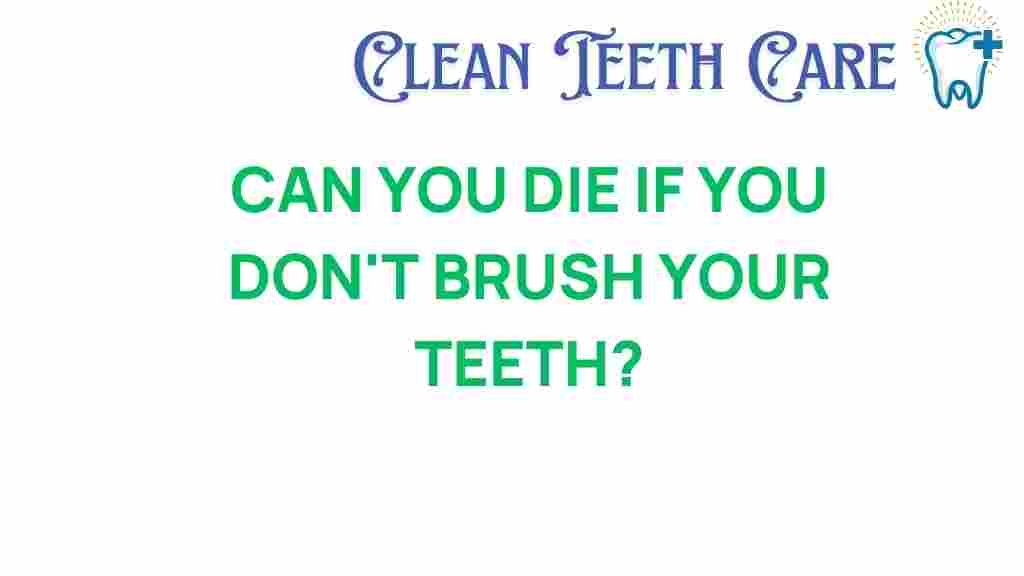The Hidden Dangers: Can Poor Oral Hygiene Lead to Death?
Oral hygiene is often underestimated when it comes to overall health. Many people think of dental care as merely a way to maintain a bright smile or fresh breath. However, the reality is much more serious. Poor oral hygiene can lead to a host of health risks that may ultimately affect one’s lifespan. In this article, we will explore the connection between oral hygiene and systemic issues, the potential dangers of gum disease, and the importance of preventative measures to mitigate dental neglect.
Understanding Oral Hygiene and Its Importance
Oral hygiene refers to the practice of keeping the mouth clean and free of disease. This involves regular brushing, flossing, and visiting the dentist. The significance of maintaining good oral hygiene cannot be overstated, as it plays a crucial role in preventing various health risks.
- Prevention of cavities and tooth decay.
- Reduction of gum disease.
- Minimization of bad breath.
- Lowered risk of systemic health issues.
When oral hygiene is neglected, the consequences can extend beyond just dental issues, leading to severe health complications that could even result in mortality.
The Link Between Oral Hygiene and Health Risks
Poor oral hygiene can lead to a variety of health risks, particularly through the development of gum disease. Gum disease, also known as periodontal disease, is an infection of the tissues that support the teeth. It begins with gingivitis, a mild form of gum disease that can cause irritation, redness, and swelling of the gums.
If not treated, gingivitis can advance to periodontitis, which can lead to tooth loss and has been linked to several systemic health issues, including:
- Heart Disease: Studies have shown that bacteria from periodontal disease can enter the bloodstream, leading to inflammation and potentially increasing the risk of heart disease.
- Diabetes: There is a bidirectional relationship between diabetes and gum disease. Poor oral hygiene can worsen diabetes control, and diabetes can increase the risk of gum disease.
- Respiratory Issues: Bacteria from the mouth can be aspirated into the lungs, causing respiratory infections and complications.
- Pregnancy Complications: Poor oral hygiene in pregnant women can lead to premature birth and low birth weight.
Gum Disease: A Gateway to Systemic Issues
The progression from gum disease to serious health problems highlights the importance of dental care. The bacteria associated with gum disease can cause inflammation throughout the body, leading to systemic issues that may contribute to mortality.
Some specific conditions linked to gum disease include:
- Cardiovascular Disease: Inflammation caused by gum disease can make blood vessels more susceptible to blockages, leading to heart attacks and strokes.
- Alzheimer’s Disease: Emerging research suggests a potential connection between oral bacteria and the development of Alzheimer’s, indicating that gum disease may influence cognitive decline.
- Kidney Disease: Chronic kidney disease has been associated with periodontal diseases, showing that oral health can impact kidney function.
Preventative Measures to Combat Dental Neglect
Understanding the health risks associated with poor oral hygiene is crucial, but knowing how to prevent them is even more important. Here are some effective preventative measures:
- Regular Brushing: Brush your teeth at least twice a day with fluoride toothpaste. This helps remove plaque and prevent gum disease.
- Daily Flossing: Floss daily to remove food particles and plaque between teeth that brushing alone cannot reach.
- Routine Dental Visits: Schedule regular check-ups and cleanings with your dentist at least twice a year.
- Healthy Diet: Maintain a balanced diet rich in vitamins and minerals, which can help strengthen your teeth and gums.
- Avoid Tobacco: Smoking and using other tobacco products can exacerbate gum disease and other health issues.
Common Troubleshooting Tips for Oral Hygiene
If you find yourself struggling with maintaining good oral hygiene, consider the following troubleshooting tips:
- Set Reminders: Use your phone or calendar to set reminders for brushing and flossing.
- Choose the Right Tools: Invest in a good quality toothbrush and toothpaste that suits your needs. Electric toothbrushes can be particularly effective.
- Use Mouthwash: Incorporate an antibacterial mouthwash into your routine to help reduce plaque and bacteria.
- Educate Yourself: Stay informed about the latest dental care practices and understand the consequences of neglecting oral hygiene.
Conclusion: The Importance of Oral Hygiene for Longevity
In conclusion, the relationship between oral hygiene and overall health is profound. Poor dental care not only leads to gum disease but can also trigger a cascade of systemic issues that may ultimately result in increased mortality. By understanding the health risks associated with dental neglect and implementing effective preventative measures, individuals can significantly improve their oral health and reduce the likelihood of serious health complications.
Take charge of your oral hygiene today. Regular dental care and good practices can ensure a healthier life and potentially increase your lifespan. For more information on maintaining oral health, visit this resource.
Remember, maintaining your oral hygiene is not just about having a pretty smile; it’s about protecting your overall health.
This article is in the category Hygiene and created by CleanTeethCare Team
